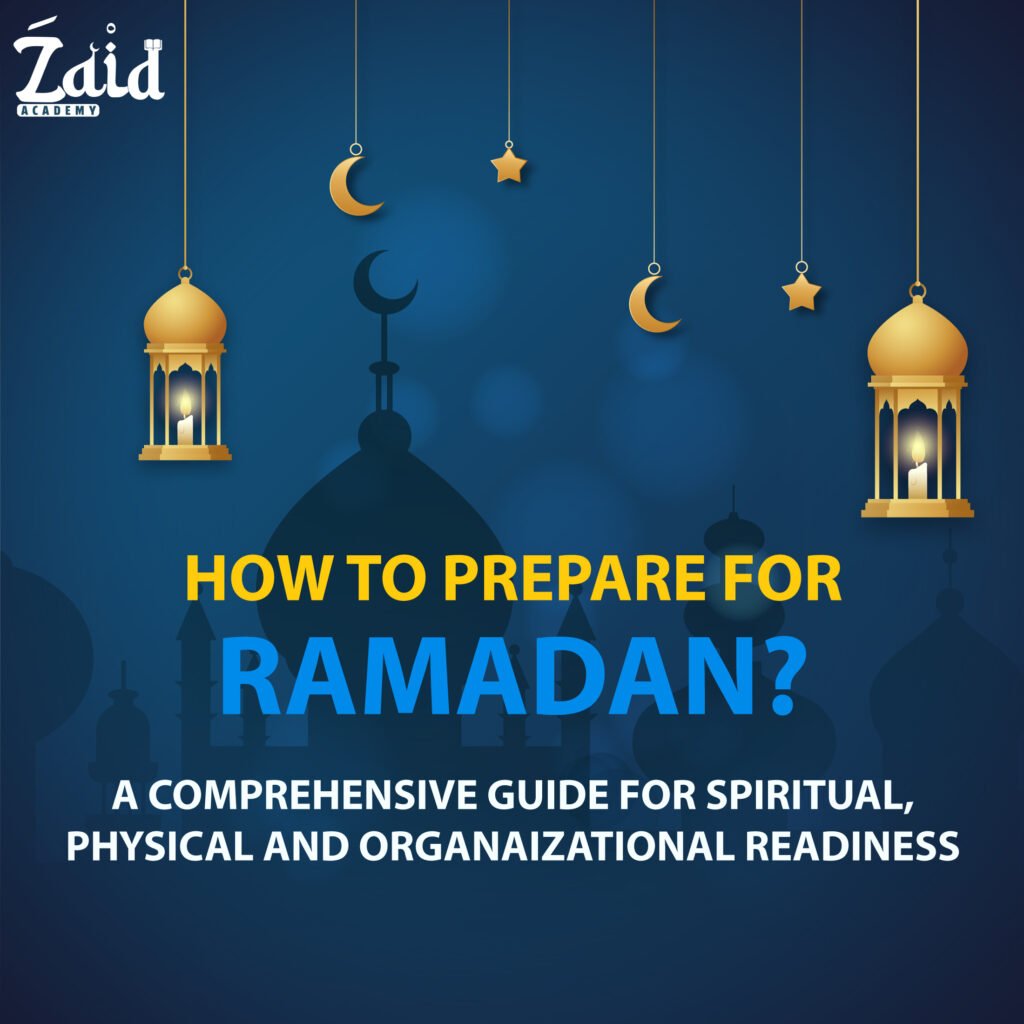Introduction
Sha’ban is a golden opportunity for spiritual and physical preparation for Ramadan, as it is the month when our deeds from the entire year are raised to Allah. Imagine the last few minutes before submitting an exam paper—you give it your all, trying to make the most of the remaining time. This is exactly what Sha’ban represents!
To welcome Ramadan in the best possible way, we need to increase our acts of worship, reflect on our deeds, and prepare ourselves mentally and physically. In this article, we provide a comprehensive Ramadan preparation guide covering spiritual, dietary, and physical readiness, along with a practical planner to help you make the most of this blessed month.
1. Spiritual Preparation for Ramadan
1. Increase Worship and Acts of Devotion
• Make more Dhikr (remembrance of Allah) and Istighfar (seeking forgiveness) to purify your heart.
• Perform prayers on time and try to incorporate Sunnah and Nafl (voluntary) prayers.
• Recite the Quran daily to develop a habit before Ramadan begins.
• Make sincere du’a (supplication), asking Allah for strength and guidance.
2. Fast More in Sha’ban
• The Prophet (ﷺ) used to fast frequently in Sha’ban, preparing himself for Ramadan.
• Fasting in Sha’ban helps you adjust your routine and gain control over cravings.
3. Purify Intentions & Set Goals
• Reflect on your intentions for Ramadan and make a sincere commitment to change.
• Set spiritual goals like finishing the Quran, praying Taraweeh, and increasing charity (sadaqah).
2. The Spiritual Discipline of Fasting: A Path to Taqwa
Fasting is not just about abstaining from food and drink; it is a means of self-discipline and spiritual purification. The purpose of fasting is to cultivate taqwa (God-consciousness) and strengthen our willpower against desires.
Allah says in the Quran:
يَا أَيُّهَا الَّذِينَ آمَنُوا كُتِبَ عَلَيْكُمُ الصِّيَامُ كَمَا كُتِبَ عَلَى الَّذِينَ مِنْ قَبْلِكُمْ لَعَلَّكُمْ تَتَّقُونَ
(البقرة: جزء 2)
“O you who have believed, fasting has been prescribed for you as it was prescribed for those before you that you may attain taqwa.” (Al-Baqarah, Juz’ 2)
This verse emphasizes that fasting is a spiritual training ground. By controlling our desires, resisting temptations, and focusing on worship, we develop discipline and a stronger connection with Allah.
Another verse highlights the significance of Ramadan:
شَهْرُ رَمَضَانَ الَّذِي أُنزِلَ فِيهِ الْقُرْآنُ هُدًى لِلنَّاسِ وَبَيِّنَاتٍ مِّنَ الْهُدَىٰ وَالْفُرْقَانِ
(البقرة: جزء 2)
“The month of Ramadan is that in which the Quran was revealed as guidance for the people and clear proofs of guidance and criterion.” (Al-Baqarah, Juz’ 2)
This verse reminds us that fasting in Ramadan is not just about physical endurance but about reconnecting with the Quran and divine guidance.
By fasting with sincerity, we develop patience, gratitude, and mindfulness, making Ramadan a period of true transformation.
3. The Reward of Fasting: Hadith Explanation
The Prophet Muhammad (ﷺ) said:
“Whoever fasts Ramadan out of faith and in the hope of reward, his previous sins will be forgiven.” (Sahih al-Bukhari, Hadith 38; Sahih Muslim, Hadith 760)
This hadith highlights the spiritual rewards of fasting:
• “Out of faith” – This means fasting with sincere belief in Allah’s command.
• “In the hope of reward” – It emphasizes the importance of intention (niyyah) and expecting Allah’s blessings.
• “His previous sins will be forgiven” – This shows that fasting purifies the soul and offers a chance for a fresh start.
Scholars explain that this forgiveness applies to minor sins, while major sins require repentance (tawbah). Thus, Ramadan is a golden opportunity to seek Allah’s mercy and renewal.
4. Physical & Dietary Preparation for Ramadan
1. Adjust Your Eating Habits
• Reduce caffeine and sugar intake to avoid withdrawal symptoms in Ramadan.
• Start eating lighter, healthier meals to make fasting easier.
• Drink plenty of water and reduce excessive snacking.
2. Plan Your Suhoor & Iftar Meals
• Prepare a meal plan for Ramadan to save time and energy.
• Focus on nutritious foods that provide long-lasting energy during fasting.
3. Improve Your Sleep Schedule
• Start adjusting your bedtime to wake up for Suhoor and Fajr prayer.
• Try to get enough rest to avoid exhaustion during fasting.
5. Organizational Readiness: Ramadan Planner
To maximize productivity in Ramadan, having a structured plan is essential. Here’s a simple planner to keep you organized:
Daily Ramadan Planner Template
Conclusion
Ramadan is a gift, and Sha’ban is the time to prepare for it. By focusing on spiritual growth, improving our diet, and organizing our time, we can welcome Ramadan with open hearts and minds.
Start today by increasing your worship, fasting, and planning your days, so when Ramadan arrives, you are ready to make the most of every blessed moment.
Let’s use these last days of Sha’ban wisely, just like the final minutes before submitting an exam. May Allah grant us the ability to make the most of Ramadan!

Zaid Academy is an online Islamic academy that provides one of the best Arabic, Quran and Islamic Studies programs for kids and adults.
All rights reserved by 2024 © Zaid Academy
Not a member yet? Register now
Are you a member? Login now